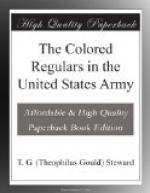Strangers who saw for the first time these people as they came out of slavery in 1865 were usually impressed with their robust appearance, and a conference of ex-slaves, assembled soon after the war, introduced a resolution with the following declaration: “Whereas, Slavery has left us in possession of strong and healthy bodies.” It is probable that at least a half-million of men of proper age could then have been found among the newly liberated capable of bearing arms. They were inured to the plain ration, to labor and fatigue, and to subordination, and had long been accustomed to working together under the immediate direction of foremen.
Two questions of importance naturally arose at this period: First, did the American slave understand the issue that had been before the country for more than a half-century and that was now dividing the nation in twain and marshalling for deadly strife these two opposing armies? Second, had he the courage necessary to take part in the struggle and help save the Union? It would be a strange thing to say, but nevertheless a thing entirely true, that many of the Negro slaves had a clearer perception of the real question at issue than did some of our most far-seeing statesmen, and a clearer vision of what would be the outcome of the war. While the great men of the North were striving to establish the doctrine that the coming war was merely to settle the question of Secession, the slave knew better. God had hid certain things from the wise and prudent and had revealed them unto babes. Lincoln, the wisest of all, was slow to see that the issue he himself had predicted was really at hand. As President, he declared for the preservation of the Union, with or without slavery, or even upon the terms which he had previously declared irreconcilable, “half slave and half free.” The Negro slave saw in the outbreak of the war the death struggle of slavery. He knew that the real issue was slavery.
The masters were careful to keep from the knowledge of the slave the events as well as the causes of the war, but in spite of these efforts the slave’s keen perception enabled him to read defeat in the dejected mien of his master, and victory in his exultation. To prevent the master’s knowing what was going on in their thoughts, the slaves constructed curious codes among themselves. In one neighborhood freedom was always spoken of as “New Rice”; and many a poor slave woman sighed for the coming of New Rice in the hearing of those who imagined they knew the inmost thoughts of their bondwomen. Gleefully at times they would talk of the jollification they would make when the New Rice came. It was this clear vision, this strong hope, that sustained them during the trying days of the war and kept them back from insurrection. Bishop Gaines says: “Their prayers ascended for their deliverance, and their hearts yearned for the success of their friends. They fondly hoped for the hour of victory, when the




